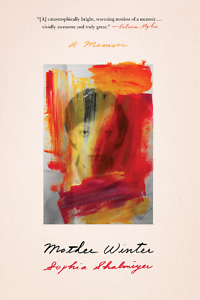Mother is a Circle
Absence haunts Sophia Shalmiyev’s captivating memoir, Mother Winter
In her debut memoir, Mother Winter, Sophia Shalmiyev creates a haunting, lyrical meditation on her absent mother, a troubled alcoholic whom Shalmiyev and her father left behind when they emigrated to the United States from Russia. This loss forms the center of Shalmiyev’s inner world, a nexus of loss and longing: “Mother is a circle—a complete and perfect hole.”

Through hypnotic prose, Shalmiyev invokes the state of mind created by being motherless. Out of that state spin the defining, interrelated aspects of Shalmiyev’s life story. Her mother’s alcoholism exposes her to dangers during her early childhood in Leningrad. After emigrating, she struggles through the refugee experience alongside her complicated, devoted single father. In early adulthood, Shalmiyev weathers self-destructive impulses of her own, makes a return trip to her native city to search halfheartedly for her mother, and embraces feminist aesthetics after moving to 1990s Portland. Last, she explores the barrage of complex questions that arise from becoming a mother herself.
These events dovetail, merge, and then remake themselves, all through Shalmiyev’s elusive, powerful prose style. Her point of view proceeds from the center of her trauma, conjuring experiences in the fragmented, nonlinear ways in which memories recur. Describing a violent bout of discipline from her father, she writes, “I’m telling the truth of a broken compass.”
To love a mother who leaves is to walk straight into a barbed trap set for you in plain sight. Shalmiyev becomes ensnared in an impossible set of contradictory needs and desires. Like her home country, where “yesterday never ended,” her origins are constantly present: “The daughters who live in flashbacks will suspend their tongues between the origin and the destination—the past more urgent than any new day.”
Shalmiyev re-experiences these early memories with immediacy and candor. Evoking her fraught childhood, she writes: “When my mother was allowed a visit, I swatted her away as she shrank into her seat. I stared toward the door, tortured her with prolonged silence.” Faced with an unwinnable conflict, she succumbs to vertigo: “I worried that if I sat on her lap, if I hugged her, if I sided with her in front of my dad and future stepmom, I would fall through a dank well in her chest and she would leave again. I would be banished to live in her chest like a traitor, an outsider, nomadic roadkill.”
 Shalmiyev locates her point of view within the sensations and cycles of the body: “[I]f you are not feeding, you are bleeding.” After years of suppressing the past, she eventually began to risk saying her mother’s name—asking questions and exploring the way her own desires as a sexually mature woman may have their roots in her mother’s story. Shalmiyev’s choice to become a mother herself provides the book’s narrative pivot, away from her painful origins and toward the life she’s building: “I will give birth twice in lieu of going back again and again to my first home, believing she is there waiting for me, staring at the door with knitting in her lap.”
Shalmiyev locates her point of view within the sensations and cycles of the body: “[I]f you are not feeding, you are bleeding.” After years of suppressing the past, she eventually began to risk saying her mother’s name—asking questions and exploring the way her own desires as a sexually mature woman may have their roots in her mother’s story. Shalmiyev’s choice to become a mother herself provides the book’s narrative pivot, away from her painful origins and toward the life she’s building: “I will give birth twice in lieu of going back again and again to my first home, believing she is there waiting for me, staring at the door with knitting in her lap.”
Woven into Shalmiyev’s narrative are artistic mothers—including Audre Lorde, Sappho, and Chris Kraus—whom she has sought in place of a physical one. Rather than traditional storytelling, she craves fragmented stories of women navigating the world: “Instability. Velocity. Refuge. Disjointedness. The only kind of narrative in motion I can stomach—defamiliarized.” She feels most at home in the language of dislocation, stemming from her years as a refugee and as a motherless child. Mother Winter shares a natural kinship with Maggie Nelson’s masterful The Argonauts and Carrie Brownstein’s Hunger Makes Me a Modern Girl.
Despite the book’s nonlinear lyricism, Mother Winter achieves “structure and order within the chaos,” a state which Shalmiyev calls “the first rule of proper mothering.” From the harrowing childhood scenes that exposed her to great harm to the poignant moments of vulnerability she shares with her own young children, Shalmiyev finds a graceful structure for the chaos in her world, and she communicates her story with shattering clarity.

Emily Choate holds an M.F.A. from Sarah Lawrence College. Her fiction has been published in Shenandoah, The Florida Review, Tupelo Quarterly, and The Double Dealer, and her nonfiction has appeared in Yemassee, Late Night Library, and elsewhere. She lives in Nashville, where she’s working on a novel.


